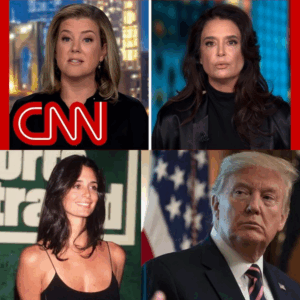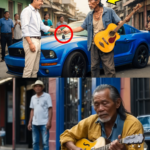In a revelation that is sending ripples through the corridors of power and celebrity, Stacey Williams, a former Sports Illustrated model and ex-girlfriend of Jeffrey Epstein, has come forward with disturbing new details about her past experiences with both Epstein and former President Donald Trump.
.
.
.
Williams, whose brush with fame started in the bright world of modeling, stepped back into the spotlight with allegations that reach deep into one of the most scrutinized friendships of recent decades: the bond between Epstein and Trump. According to Williams, the two men were inseparable during the early 1990s, with Trump being an ever-present figure whenever she spent time with Epstein. “They were best friends,” Williams declared in a recent interview, adding that Epstein would almost incessantly mention Trump, weaving anecdotes about his “bro” and “wingman” into their private conversations.

But it is an incident at Trump Tower in 1993 that has thrust Williams into the heart of a controversy now dominating the news cycle. Williams alleges that during a visit to Trump’s offices, in the company of Epstein, she was aggressively groped by Trump while Epstein looked on—an event she now describes as a “weird, twisted game.” According to Williams, the two men exchanged knowing smiles during the alleged assault, as if what was unfolding was coordinated.
Visibly emotional as she recounted the story, Williams described freezing in shock as Trump touched her intimately while maintaining a casual conversation with Epstein, despite assistants moving in and out of the office. “When it’s that brazen, that public, you freeze,” she said. The aftermath was equally disorienting; Williams says Epstein became furious with her, berating her on the street for allowing the assault to happen.
These claims come with corroboration from friends whom Williams told about the incident years—even decades—ago, lending weight to her allegations. She also underwent a polygraph test before making her accusations public and notes that author Michael Wolff has documented hours of interviews with Epstein where he reportedly admitted to the event. Williams insists she has “the receipts,” referencing a love note she says Trump sent her post-assault, while challenging the former president to provide evidence to the contrary.
Trump, for his part, has denied all allegations through his campaign. His team dismissed Williams’s story as fabrication and cited his long-standing claim never to have written nor drawn the kind of suggestive material referenced in a now-infamous 50th birthday album for Epstein.
Yet Williams remains resolute, painting a damning portrait of the Epstein-Trump relationship. She describes Epstein as fixated on Trump, enmeshed in a relentless social dynamic that, by her account, sometimes shielded and enabled disturbing behavior. Recalling her own fierce reputation in the industry for rebuffing unwanted advances, Williams now believes Epstein “delivered” her to Trump to see what would happen, given her reputation for standing up to harassment.
The story doesn’t exist in a vacuum: it unfolds against the backdrop of renewed public examination of Epstein’s network and the high-profile individuals who orbited his world. The allegations, if true, reinforce dark questions about the culture of impunity and complicity that have surrounded both men.
As Williams issues her challenge—“Where are the receipts?”—the onus shifts to those accused to respond, even as the public reckons with the uncomfortable truths that continue to emerge from the shadows of power and privilege.
News
Heartbreaking: Hulk Hogan’s Last Wish Revealed—You Won’t Believe His Ultimate Regret!
Hulk Hogan’s Final Tragedy: Wrestling Icon Dies Estranged from Family, Never Meeting His Grandchildren July 2025 – The world of…
Astronomer Hires Gwyneth Paltrow—Her EPIC Response to Chris Martin’s Controversy!
Gwyneth Paltrow’s Ultimate Power Move: How She Turned Her Ex-Husband’s Joke Into Tech’s Most Brilliant PR Stunt Boston, 2025 In…
Leaked Footage SHOCKS Fans: Kristin Cabot & Billionaire Andy Byron in Hot Water After Coldplay Kiss Cam!
The $38 Million Kiss: How a Viral Coldplay Concert Clip Sparked the Most Expensive Scandal in Tech History Boston, July…
Melania BETRAYS Trump: Epstein Bombshell DROPS at the WORST Possible Moment!
Melania’s Revenge: Will Trump’s Wife Be the Ultimate Betrayer in the Epstein Scandal? She Was Never Loyal—And Now the Truth…
Elon Musk EXPOSES Trump’s Criminal Secrets—Ghislaine Coverup UNRAVELS LIVE!
When Justice Is for Sale: The Maxwell Gambit, Trump’s Power Play, and America’s Crisis of Truth Washington, August 2025 —…
King Charles SHOCKS Trump & Melania With LIVE TV Bombshell—Watch Trump Explode!
The Final Unraveling: Trump’s Epstein Inferno Reaches the Palace Gates August 2025, London/Washington — The wildfire of the Epstein scandal…
End of content
No more pages to load












